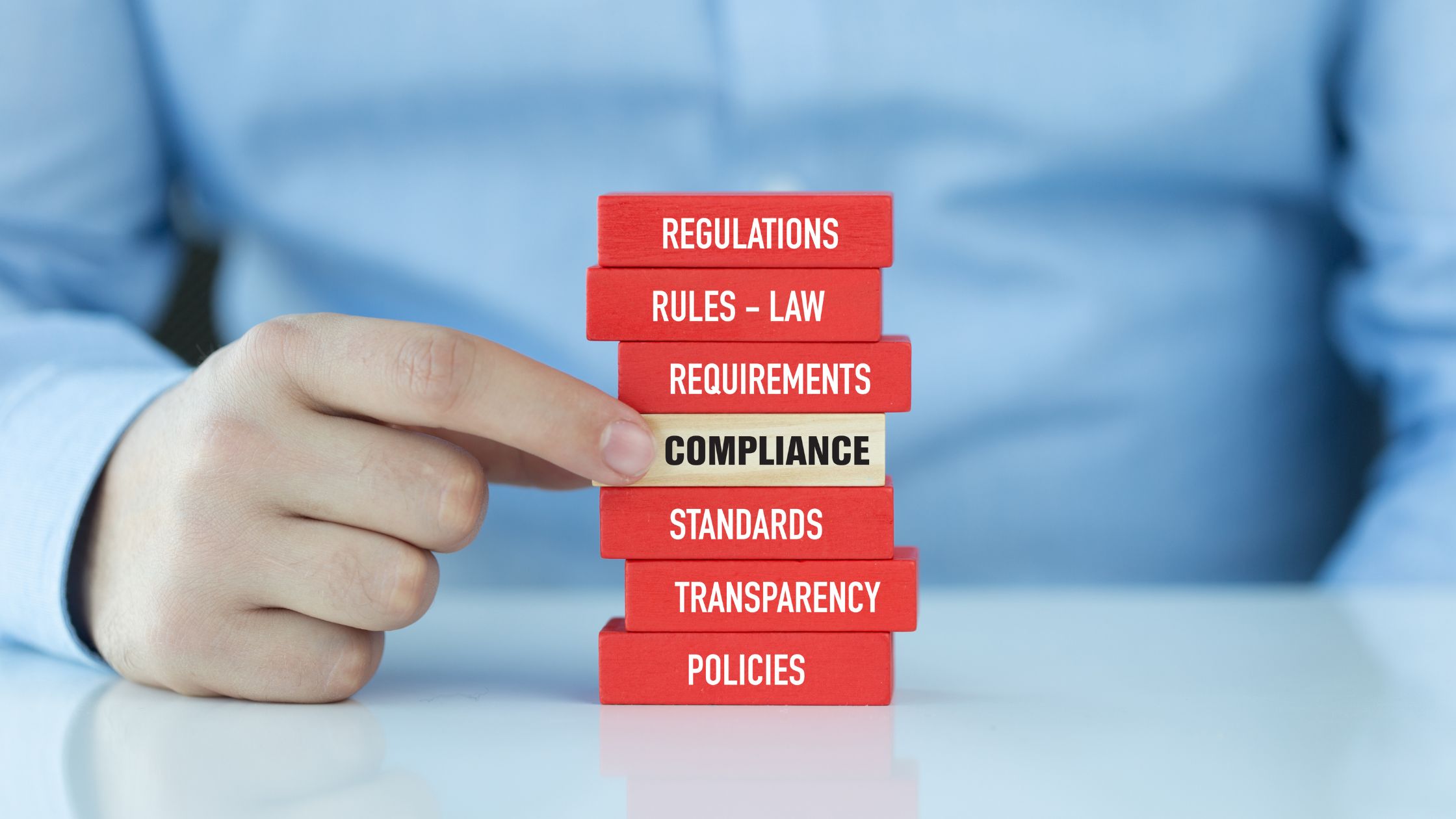From safeguarding employee rights to avoiding hefty fines, knowing the key compliance regulations is more than just a legal requirement—it’s a strategic advantage. In this guide, we’ll break down the 10 essential workplace compliance regulations every employer must know to create a fair, safe, and legally sound work environment.
What is Workplace Compliance?
Put simply, “compliance” means adhering to all applicable rules. This involves federal, state, and local regulations, as well as your company’s internal policies and procedures. Compliance is relevant to everyone within your organization, no matter their department or role. Below are some important areas that compliance encompasses:
- Preventing discrimination
- Protecting data
- Safeguarding the environment
- Ensuring health and safety
- Paying your fair share of taxes
Beyond these specific rules, compliance also encompasses acting ethically as a company and fostering ethical behavior among your employees. Ultimately, effective compliance protects both your employees’ physical and mental health.
10 Must-Know Compliance Guidelines for Employers
1) Anti-discrimination Laws
This is a cornerstone of workplace compliance. Federal laws like the Civil Rights Act prohibit discrimination based on race, color, religion, sex (including pregnancy), national origin, age (40 or older), disability, or genetic information. Employers must prevent discrimination in all employment practices.
Key anti-discrimination laws include:
- Title VII of the Civil Rights Act,
- the Americans with Disabilities Act (ADA),
- the Age Discrimination in Employment Act (ADEA), and
- the Genetic Information Nondiscrimination Act (GINA).
Preventing discrimination is crucial for avoiding lawsuits, reputational damage, and losing valuable talent. A diverse and inclusive workplace also drives innovation and improves decision-making. Violations can result in costly fines and legal battles.
2) Fair Labor Standards Act (FLSA)
The FLSA sets national standards for minimum wage, overtime pay, recordkeeping, and child labor standards. It dictates overtime pay requirements after 40 hours per week and establishes the federal minimum wage of $7.25 per hour.
Key provisions include paying non-exempt employees 1.5 times their regular rate for overtime hours, as well as restrictions on working hours for youth under 16 and prohibitions on hazardous occupations for those under 18.
Employers must maintain accurate payroll records and regularly review policies to ensure FLSA compliance around minimum wage, overtime, recordkeeping, and youth employment standards. Failure to do so can lead to steep fines and damages.
3) Family and Medical Leave Act (FMLA)
The Family and Medical Leave Act (FMLA) grants eligible employees up to 12 weeks of unpaid, job-protected leave each year for family and medical reasons. This includes situations such as childbirth, adoption, caring for a seriously ill family member, or addressing their own serious health condition. To qualify, employees must meet specific tenure and minimum hours worked requirements. Employers must maintain health coverage during FMLA leave. Today, FMLA compliance issues are common, with 60% of employers reporting challenges like managing intermittent leave and determining serious health conditions.
Violations can result in litigation and hefty damages. Clear policies, proper leave tracking, medical certifications, and legal guidance on complex cases are crucial to avoid costly FMLA penalties.
4) Occupational Safety and Health Administration (OSHA)
OSHA provides guidelines for maintaining a safe workplace environment free from hazards. Employers must comply with OSHA standards on hazard control, personal protective equipment, safety training, recordkeeping, and reporting.
OSHA enforces its standards through workplace inspections. Prior research reveals that OSHA conducted 76,816 inspections and issued $194 million in penalties for violations like inadequate fall protection and failure to communicate hazards. Many states also have their own job safety regulations that may be more stringent than federal OSHA rules. Employers must diligently follow all applicable OSHA standards to ensure worker safety.
5) Wage and Hour Laws
Beyond the federal FLSA, employers must comply with a patchwork of state and local wage as well as hour laws. These may include higher minimum wages, paid sick leave requirements, rules around meal and rest breaks, overtime calculations, and more. Penalties for violations can be significant at the state level as well.
6) Employee Classification
Classifying employees as exempt (salaried and ineligible for overtime) or non-exempt (hourly and eligible for overtime) is crucial for FLSA compliance.
Exempt employees are salaried and ineligible for overtime pay. Non-exempt employees must receive overtime pay when working over 40 hours per week. Misclassifying workers as exempt when they should be non-exempt is a common FLSA violation that can lead to costly back wages, fines, and litigation. Employers should carefully analyze job duties against FLSA exemption criteria.
7) Immigration Law
Ensuring that all employees are legally eligible to work is a critical compliance requirement. Employers must follow the I-9 verification process, which involves confirming each employee’s identity and work authorization. The Immigration Reform and Control Act (IRCA) strictly prohibits the hiring of unauthorized workers, and non-compliance can lead to fines, legal penalties, and damage to a company’s reputation. Employers must maintain proper documentation and be prepared for potential audits or investigations by immigration authorities.
8) Data Privacy Regulations
With the growing importance of data privacy, employers must adhere to specific regulations governing the collection, storage, and use of personal employee information. Laws such as the Health Insurance Portability and Accountability Act (HIPAA) ensure the protection of medical information, while the General Data Protection Regulation (GDPR) establishes stringent rules for processing the personal data of employees in the European Union. These laws dictate how sensitive information—such as medical records and personally identifiable details—can be collected, stored, shared, and used. Non-compliance can result in severe financial penalties and legal consequences.
9) Unemployment Insurance
Employers are responsible for contributing to unemployment insurance programs, which provide financial support to workers who lose their jobs through no fault of their own. The amount employers must contribute is determined by their state’s unemployment tax rates, which are influenced by factors such as industry type and history of layoffs. Staying informed about your state’s contribution rates, filing deadlines, and reporting obligations is crucial for ensuring compliance and avoiding penalties.
10) Workplace Posters
Federal and state laws often mandate that employers display specific posters in the workplace to inform employees of their legal rights and responsibilities. These posters typically cover topics such as minimum wage, occupational safety, anti-discrimination protections, and employee rights under the Family and Medical Leave Act (FMLA). Failing to display required posters can result in fines and citations during government inspections. Keeping workplace postings current and accessible to all employees is a simple yet essential aspect of maintaining regulatory compliance.
Conclusion
This list offers a foundation, but workplace compliance can be intricate, with regulations varying by location and industry. To ensure full compliance with all applicable laws, it’s advisable to consult a human resources professional or legal expert. They can provide tailored guidance to help you navigate the complexities and stay up to date with evolving requirements.
For companies looking to expand their workforce internationally, utilizing Employer of Record services can be a valuable tool to navigate the intricacies of foreign employment laws. Our advanced payroll solutions at Procloz combine the power of business automation and EOR. With a global presence, including specialized Australian payroll services, we ensure accurate and compliant payroll processing, tax filings, and employee benefits administration. By making workplace compliance a priority, you create a safe, equitable, and legally sound environment for your employees, while also reducing the risk of costly lawsuits and penalties.





